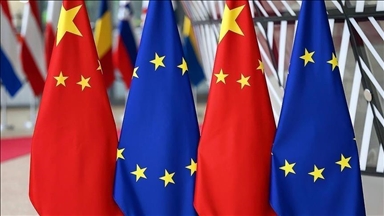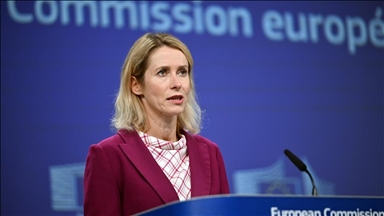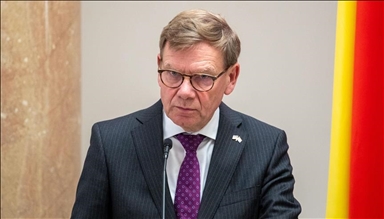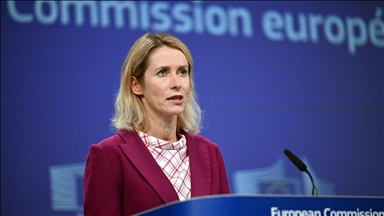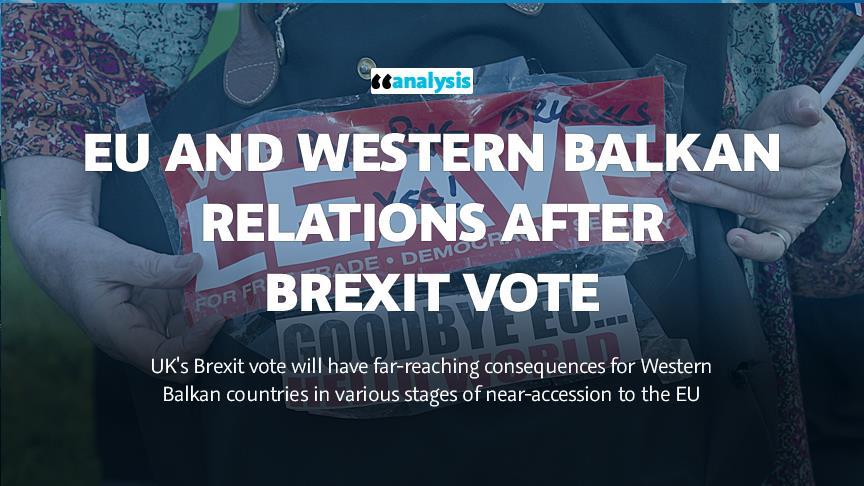
By Selin Calik Muhasilovic
ISTANBUL
A majority of voters in the United Kingdom supported a referendum to leave the European Union last Thursday, shocking their fellow countrymen, markets and the world.
Britain’s decision to leave the EU will have political and economic effects, not only on Britons but also on Balkan countries, that it may take many years before they are fully understood.
After Croatia’s accession in 2013, six more Balkan states are waiting for a similar fate: Montenegro, Serbia, Bosnia-Herzegovina, Kosovo, Macedonia, and Albania- – together home to around 20 million people.
In these countries, European integration is the main focus of national policies. Serbia and Montenegro have already started the accession negotiations, whereas Bosnia-Herzegovina has applied for the status of candidate country. Macedonia has gained this status in 2005 but has not yet started accession negotiations, due to Greek opposition and a long-standing name dispute (The country bears the same name as a northern Greek region).
Kosovo gained independence from Serbia on Feb. 17, 2008, and has now signed the Stabilization and Association Agreement (SAA) with the EU. It is hoping for quick progress towards the status of candidate country, asking first the abolition of visas for Kosovars traveling within the EU.
Balkan officials concerned after Brexit vote
Balkan officials voiced concerns last Friday about the uncertain future of the EU following Britain’s vote to leave the EU while affirming their commitment to European integration.
Prime Minister of Serbia Aleksandar Vucic called the Brexit result “the biggest earthquake to hit Europe since the fall of the Berlin wall”.
He noted that the government of Serbia would proceed with the EU accession process and attracting foreign investments.
Montenegro President Filip Vujanovic, gave a statement to a MINA news agency in which he explained that the country will continue on its EU path, and was dedicated to European values.
The prime minister of Bosnia and Herzegovina, Denis Zvizdic, said that Brexit results should not have an impact on Bosnia’s efforts to join the EU. He argued that small countries like Bosnia and Herzegovina are destined to be insecure unless they join the EU.
“Leaving or joining the EU is a matter of public opinion, and over 76 percent of Bosnian citizens support EU accession,” he added.
Albanian Prime Minister Edi Rama has taken to the pages of the London Times to tell squabbling U.K. politicians to leave Albania out of the acrimonious debate on Britain’s EU membership. Rama wrote that it was “a bit weird” to see his country looming so large in an argument about whether Britain would be better off outside the EU.
Making clear how he would vote if he was a British citizen, Rama concluded: “Most countries on the edges of Europe want in, because we know the remarkable benefits there have been to EU countries. I cannot believe it can be in Britain’s interest to look for a model in Albania or to emulate the current status of Albanian-European relations. We are not ourselves interested in the status quo. Why would anyone in Britain be?”
Impact of Brexit on Balkan and EU relations
Despite the strong reactions by the leaders in the region aimed at minimizing the potential impact of Brexit, three days after the vote first concerns started to emerge. EU member-states on Monday once again failed to agree to open chapter 23 in Serbia's EU accession negotiations.
In the absence of a consensus necessary to open chapters 23 and 24 in negotiations with Serbia, the issue could be postponed to July or September of this year.
Analyzing the possible scenarios resulting from last Thursday's vote, professor of southeast European history and politics from University of Graz Florian Bieber thinks that the Western Balkans are not only losing a key advocate for enlargement, but Brexit will consume the EU’s policy and bureaucratic apparatuses for years and reduce the interest in enlargement.
“Finally, Brexit will greatly diminish the pull of accession and thus the impetus for democratic reforms in the region.” he added.
EU Commissioner for Enlargement Johannes Hahn said in Vienna on Friday that the outcome of the U.K.'s EU referendum must not and will not stop the EU enlargement process.
"The EU is still committed to the enlargement, there is no doubt about it – we are continuing the work that we have started, which is “by far not complete”, Hahn stated at a conference on public administration as a foundation of European integration.
A lot has been achieved in the Balkans in the past couple of years and we should not become “tired or desperate” after Thursday’s referendum in the U.K., he added.
U.S John Hopkins University professor and balkanologist, Daniel Serwer, commented on the outcome of referendum focusing on the benefits for Russia.
“The Balkans will suffer from Brexit. Brexit will open the door for increased Russian influence in Balkan countries. Vladimir Putin will surely increase pressure on Serbia, Republic of Srpska and Macedonia in deterring them from EU and NATO's doors,” he said.
Anadolu Agency website contains only a portion of the news stories offered to subscribers in the AA News Broadcasting System (HAS), and in summarized form. Please contact us for subscription options.




